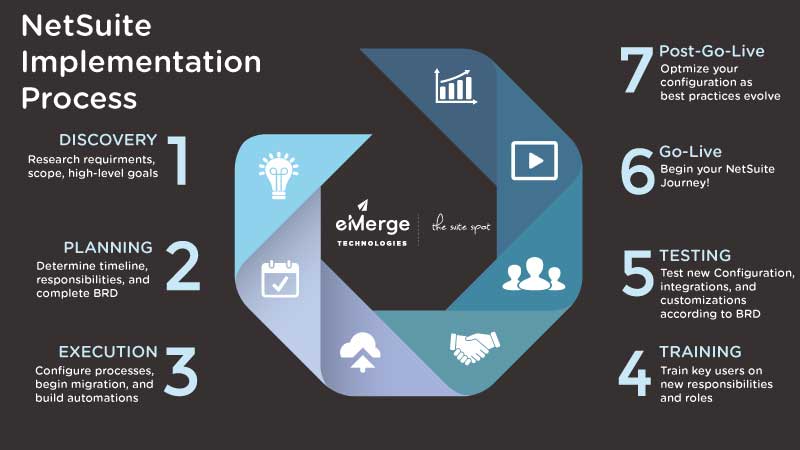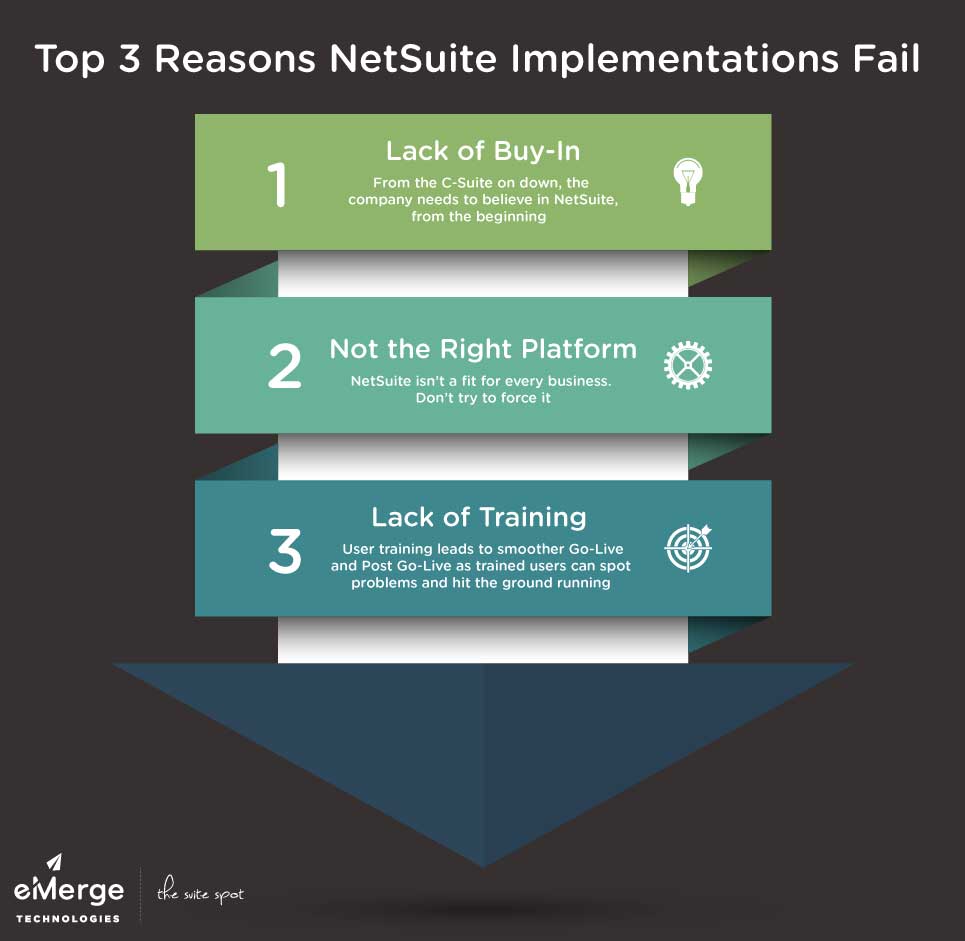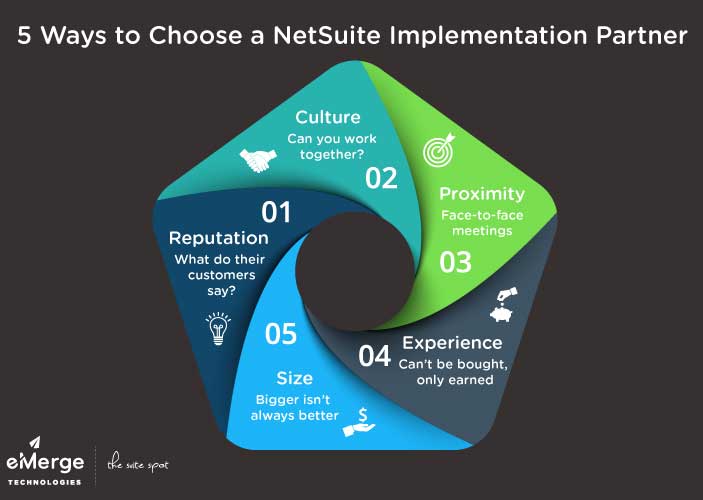- CALL : (+1) 407-273-1001
- Main Office : (+1) 407-273-1001
- main NetSuite NetSuite Implementation
- Dec 20
- 11 mins read
NetSuite Implementation: A Step-by-Step Guide for 2023
Preparing for an upcoming NetSuite ERP Implementation? You have come to the right place! And you are right to do some research before getting started; ERP implementations are notoriously tough to get right. Here are a few stats to help you understand the challenge you’re up against.
- 80% of customers are unhappy with their implementation
- 57% Take longer than expected
- 54% Go over budget
Source – ERPFocus
One of the keys to a successful NetSuite ERP implementation project is proper planning. If you know what to expect and how to account for it, your team won’t have to worry about statistics.
In this regard, a NetSuite implementation project is actually a lot like writing an essay. The more time you put into planning and research the less time you’ll have to put into writing and editing. Imagine how hard it would be to write a 10-page essay without doing any planning. There would be a lot of starting and stopping, along with editing on the fly. And you’ll quickly learn that editing a NetSuite implementation is much harder than hitting the delete button on a keyboard.
However, you’re already on the right path to success because this guide will discuss in detail all of the essential aspects of the implementation you’ll need to plan for and much more.
We created this guide because we often get emails or comments with questions like:
-
-
- Is there a “best” NetSuite implementation process?
- How much does it cost to implement NetSuite?
- How do I pick a NetSuite implementation consultant?
- What are some common NetSuite implementation issues?
- What does the average NetSuite Implementation timeline look like?
- What causes NetSuite implementations to fail?
- What are my NetSuite Implementation options?
-
This guide will do its best to answer all of these questions. Even though many of these questions will depend on the individual circumstances of the company, we will do our best to provide insights based on the factors involved. Also, if you feel this guide is not enough and you have questions and problems you feel that experts should be handling, eMerge Technologies has a group of expert NetSuite consultants ready to help at a moment’s notice.
So let’s dive in and learn how to manage a successful NetSuite ERP implementation!
Get a NetSuite Implementation AssessmentGet a NetSuite Implementation Quote
What is a NetSuite Implementation?
A NetSuite implementation is the process of setting up and configuring the NetSuite software to meet the specific needs and requirements of a business. This includes tasks such as customizing modules, integrating with other systems, and training users on how to use the software effectively.
NetSuite Implementation Steps
- Discovery
- planning
- Execution
- Training
- Testing
- Go-live
- Post-Go-Live
It is important to note that not every NetSuite consultant follows the exact path. However, this is the template that we believe provides the most success for our clients.

Discovery – Sticking with our essay analogy, the discovery process is the research part of the project. During this step, all of the important questions are asked and answered.
-
-
- High-level goals identified
- Project scope identified
- Potential integration systems identified
- Migration systems identified
- NetSuite gap analysis performed and customization options discussed
- A business process questionnaire (BPQ) filled out by the internal team
- Requirements and business processes discussed
-
Pro Tip: A thorough BPQ questionnaire is a key to a successful discovery process. Our questionnaire currently has over 80 questions. The internal team should do its best to provide fine details to allow for a smooth transition.
Planning – The planning process establishes the timeline, identifies key resources, and responsibilities for the internal and external teams.
-
-
- Key team members and responsibilities established (project manager, executive sponsor, subject matter experts, developers, analysts, others as needed)
- On-boarding key users (controller, CIO, others as needed)
- Project timeline established; complete with weekly or monthly status meetings and key milestones
- Process engineering – outline how old processes will be converted into new processes congruent with NetSuite
- Business Requirements Document (BRD) completed, reviewed, and signed by key stakeholders
-
Execution – This is where you start getting hands-on with the NetSuite software.
-
-
- Migrate data from previous system, if needed
- Configure Key NetSuite processes like “procure-to-pay” and “order-to-cash” and other business-specific processes outlined in planning the phase
- Set up chart of accounts and account balances
- Configure NetSuite settings such as accounting, shipping, cost, and security preferences
- Configure NetSuite module settings based on requirements established in previous phases
- Build automations, integrations, workflows, and customizations according to requirements
- Set up roles and permissions
- + more depending on unique requirements
-
Training – This is an often underrated step that we find is a huge factor in the success of the implementation after the external resources have left. If the users are not properly trained, then how can they be expected to take advantage of the application after the experts leave? Simply, they cannot. Proper training allows users to hit the ground running and spot problems with NetSuite functionality earlier on.
Sources of training include:
-
-
- Courses offered by NetSuite
- Proprietary training courses from NetSuite partners
- Workshops and training documentation set up specifically for the users by the implementing partner
- Online tutorials and guides
-
Pro Tip: It’s best to start the training process during the execution phase of the process and before the testing phase. This way, users will have more time to get used to the platform before they have to sign off that the implementation has met requirements.
Testing – The testing process is another often overlooked part of the NetSuite implementation process. Rigorous testing is required to make sure that the result matches the agreed-upon business requirements set up during the BRD. There could be multiple phases of testing, depending on the needs of the business.
Use-Case Testing – Development and external teams make sure all of the processes and customizations set up during the execution phase of the process are working according to the requirements established in the BRD.
User Acceptance Testing – Users test the processes and customizations set up during the execution phase. This is why we suggest beginning training before the testing phase begins. How can users verify the work of the implementation team if they don’t know how NetSuite works?
Go-Live – Cross your fingers and “flip the switch.” This is when you find out if all that hard work and planning has paid off as you begin to use NetSuite for real business purposes.
Post-Go-Live-Support – Keep those external resources close by in the next few months as problems that you may have missed during testing and go-live may not pop up right away. Also, achieving maximum ROI with the platform is an ongoing process and will require tweaking and upgrades throughout the years ahead. If your implementation partner has got you this far, it’s probably a good idea to keep them around as they will be the most familiar with your environment to discuss future upgrades.
NetSuite ERP Implementation Issues

So, where can things go wrong, and how do NetSuite implementations fail? We went over this in-depth in another article that you can find here, but there are more than a few reasons NetSuite ERP implementations crash and burn.
Lack of Buy-In – If the C-suite doesn’t completely buy in and/or they are unable to get buy in from their key players, then they’ll be hard-pressed to come up with the support and resources the platform will need to perform optimally. And if things get dicey during the implementation, they may be closer to pulling the plug than they are opening up the budget to provide the resources required to get things back on track.
You don’t just want to get the C-suites approval for this project, but you want them to be the leading cheerleaders for the success of the project. They need to believe that NetSuite is worth the effort and keep the internal team motivated to finish the implementation strong.
It’s also a difference-maker to get the user’s buy-in. After all, this will be the system they will be using for their day-to-day tasks. If they aren’t impressed, they may drag their feet throughout the whole process, making things more difficult when it comes time for training, testing, and after go-live.
NetSuite Was Never the Right Platform – There is always a lot of hype around NetSuite because it has been around since the beginning of cloud and is a leader in the industry. However, you don’t want to let that hype fool you. Make sure NetSuite has most of the requirements you need in its native functionality and modules. Otherwise, you could end up having to overcompensate with customizations, and that can start you off on the wrong track.
NetSuite does best in these industries:
-
-
- Software
- Manufacturing
- Wholesale
- Retail and Ecommerce
- Apparel
- Advertising, Media and Publishing
- Professional Services
-
Get a NetSuite Implementation AssessmentGet a NetSuite Implementation Quote
User-Side Functional Gaps – This follows up on our point regarding lack of buy-in. If the users are not familiar with the platform or worse don’t want to learn a new platform, this will cause problems near the end of the implementation and during go-live. User-acceptance testing is a big part of making sure the implementation team has done their job correctly. And apathetic or poorly trained users can’t hold the team accountable for meeting their requirements if they don’t understand the tests they’re performing. These problems will extend into go-live as all the experts will leave, and then you will just have a team of users who don’t understand how to do their job anymore.
You Didn’t Keep it Simple – You do not want to overcomplicate the initial implementation with the NetSuite system. Extensive customizations can complicate the implementation to the point of failure, as well as sour first-time user’s experience with buggier and slower system performance.
Pro Tip: Only customize the NetSuite platform as a last resort. Use modules and other made-for-NetSuite extensions before hiring developers to do custom work. If possible, change your internal processes to match NetSuite as opposed to changing NetSuite to match internal processes.
Lack of Experience on the Implementation Team – NetSuite, like most enterprise ERP systems, takes time to get used to. Its nuances aren’t something you’ll get your head around in a few days. You’ll want some people on the team who have successfully implemented the system before. I have personally heard horror stories of enterprise companies with budgets in the hundreds of thousands that have failed to implement because they didn’t have any NetSuite experience on the team.
For more tips on how to make sure your implementation is successful click here to read our article, “5 Things You wish You Knew Before Your NetSuite Implementation.”
NetSuite Implementation Time
Generally speaking, a NetSuite implementation can take anywhere from three to six months on average. The length of a NetSuite implementation can vary depending on several factors such as the size and complexity of the organization, the scope of the project, and the level of customization required.
In our experience, there are three kinds of NetSuite implementations.
-
-
- Simple – Implementation is pretty much functional out-of-the-box; the customer is a single entity with no complex processes and no add-on modules or customizations required. Less than 10 users.
- Normal – Implementation is for single or multiple entities that have minimal functional gaps and add-on modules needed. Company uses single currency and language. Between 10-100 users.
- Complex – Implementation is for more than one entity with multiple locations, currencies, and languages. There are multiple functional gaps and more than one integration. Over 100 users.
-
Factors that Add to NetSuite ERP Implementation Length – In general, the more complexity, the longer the implementation will take.
-
-
- How much data migration is required
- Available Resources (integration/ETL tools, subject matter experts, dedicated staff)
- Number of Customizations/Functional Gaps
- Number/Complexity of Processes
- Number of Integrations
- Number of Users
- Number of Currencies
- Number of Subsidiaries
- Number of locations
-
How Much Does an Implementation Cost?
*Disclaimer* The following estimates are based on proprietary experiences and data. And may not reflect your individual experience.
The reason we need to start this chapter with a disclaimer is because of complexity. Business process complexity is a critical factor in determining the cost of your NetSuite ERP implementation. And since every business is different, it’s hard to come up with an estimate without knowing specifics.
If we had to give you a range, depending on the size of your business and complexities involved, an average NetSuite implementation could cost anywhere between $25,000 – $100,000, and possibly more.
Factors Determining NetSuite Implementation Cost
Migration – Depending on the complexity of the data conversion, you may need some assistance from professional services or even a dedicated ETL tool. If you’re a smaller business and need a simple transfer, you can expect to pay around $1000-2500. For an enterprise with complex needs, you can expect to pay around $10,000 or more for data migration.
Customization – NetSuite Development runs in the range of $140-$200 per hour. Depending on the number of functional gaps you need to close, you could be looking at anywhere from $10,000 to $60,000 in development fees.
Integration – Most NetSuite ERP implementations come with some sort of integration attached to it. The world’s number 1 ERP is much more effective when connected to a top-tier eCommerce, CRM, or 3PL. There are several integration tools that work well with NetSuite; you can learn more about your options Here.
Depending on your needs, you may be interested in a simple connector (about $3600 per year) or a complete platform (ranging from $12,000-$48,000 per year). You should also factor in the costs of implementing the integration solution itself, which can cost between $1,000 to $12,000.
Training – We mentioned before how important training is to the success of your implementation and overall ROI with the platform. NetSuite has all of its training prices listed on their website. They also are willing to package training in with the sale of the software and cut you a deal. We recommend to at least have one member of the internal team take the NetSuite Essentials course and also recommend you continue to invest in training every year you have the platform.
Check out our other article to learn more about How Much A NetSuite Implementation Costs.
Pro Tip: For the initial year, expect to pay around $4000 per administrator and $2000 per user. Then, roughly half of that in follow up training every year after that.
What are my Implementation Options?
There are three options when it comes to NetSuite ERP implementations:
Self-Implementations: Not generally recommended unless you have a number of experienced NetSuite resources like developers and functional experts in house.
Pro Tip: You should expect the implementation to take up a majority of the implementation teams time during the day. So expect burn out if you still want employees to keep up with their normal tasks and keep the implementation on schedule.
Direct Implementation: You can simply get the implementation done with the help of NetSuite. Experience won’t be an issue, of course, as they are the makers of the product. However, it is usually not recommended to go this route. NetSuite’s implementation service does not have the best reputation.
Partner Implementation: Having a NetSuite partner or team of experienced NetSuite contractors handle your implementation is the most recommended option. You can choose the best partner for your needs with experience in your industry, and most of the partners are smaller organizations that can provide top-tier customer service with a personal touch and quick response time.
Get a NetSuite Implementation AssessmentGet a NetSuite Implementation Quote
Choosing the Right NetSuite ERP Implementation Partner

Here is a list of factors you’ll want to consider when selecting a NetSuite implementation consultant.
Partner Reputation: Ask around when you’ve narrowed down your list of options. If you don’t have any contacts that can help you, the unofficial NetSuite community on Reddit is friendly, and they don’t mind speaking directly.
Company Culture: You’re going to be working intensively with these people for weeks or even months. Give some thought to culture fit, and make sure they’re people you and your team will want to be involved with daily.
Proximity: This factor is less important than the others but the ideal partner is relatively close to your business. Some things are better done face-to-face. And a NetSuite ERP implementation, especially the discovery and planning stages, is one of those things.
Company Experience: Experience matters, as we discussed previously. NetSuite-specific experience is not something you can buy. It takes years to build up expertise and strong dedication is required to stay current on NetSuite developments.
Pro Tip: Ideally, you would like to have a partner that has had some experience implementing NetSuite within your specific industry.
Company Size: It’s best to go with a smaller company to manage your NetSuite implementation. This is not a project where you want to be waiting on hold for customer service or to feel like a number. Make sure you get a partner that can give you direct emails and names of dedicated team members that you can reach at all hours of the work-day.
Want more information? Check out this in-depth guide on how to find the perfect NetSuite implementation partner for your needs!
Ready to Take the Plunge?
Are you feeling better about going through with a NetSuite implementation now that you’ve read this guide?
If you have specific questions about a NetSuite implementation or are looking for a partner, eMerge Technologies has years of experience with the NetSuite platform, and we can help you with everything from implementation to customization and support. Learn more about our consulting services Here!
If you’re reading this and already went through an implementation, tell us about your experience in the comments below!
Finally, if you want to learn more about all things NetSuite, check out our Complete Guide on Oracle NetSuite.
Jeremy McCourt is an content producer in the enterprise software industry that focuses on NetSuite and related cloud-based software solutions.
Related Posts

NetSuite Training 101 (The 2023 Complete Guide)
NetSuite training is an underrated and often overlooked part of the NetSuite ecosystem. In this article, we do what we can to break down why NetSuite training is a critical part of NetSuite users finding…
- Aug 21
- 6 mins read

What is NetSuite Customization? The 2023 Complete Guide
NetSuite, as a leading cloud-based ERP system, has gained immense popularity among businesses worldwide. However, to truly harness its potential, customization is often necessary. In this comprehensive guide, we delve into the world of NetSuite…
- Aug 16
- 6 mins read
